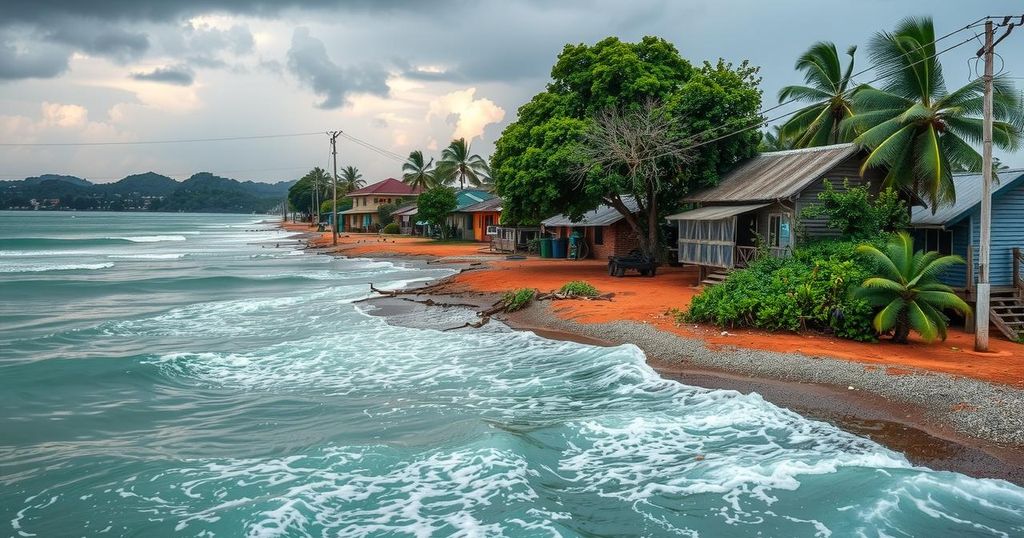World news
AFRICA, CHI, CHIDO, CLIMATE, CLIMATE CHANGE, CLIMATE CHANGE AND METEOROLOGICAL SERVICES, FRENCH INDIAN OCEAN, GLOBAL WARMING, GUY TAYLOR, INAM, LUCY MTILATILA, MALAWI, MOZAMBIQUE, NATIONAL INSTITUTE OF METEOROLOGY, NATURAL DISASTERS, PARIS AGREEMENT, PEMBA, UNICEF, ZIMBABWE
Stella Nguyen
0 Comments
Cyclone Chido: A Growing Climate Crisis for Mozambique and Malawi
Cyclone Chido has devastated northern Mozambique and Malawi, displacing thousands and increasing concerns over the region’s vulnerability to climate change. The cyclone’s intensity reflects a broader trend of more frequent severe weather in southern Africa, prompting urgent humanitarian responses and calls for improved disaster preparedness. Experts emphasize the need for resilient infrastructure and proactive community planning to address the region’s ongoing challenges.
Cyclone Chido has inflicted significant damage across northern Mozambique and parts of Malawi, following its destructive path after striking Mayotte in the Comoros archipelago on December 15. Thousands have been displaced primarily in the Cabo Delgado and Nampula provinces as a result of the cyclone’s ferocity. The cyclone continued the worrying trend of increasingly frequent and severe weather events affecting Southern Africa, a phenomenon exacerbated by climate change.
Historically, tropical cyclones impacted Malawi approximately once every decade, but now they are occurring with alarming regularity. Lucy Mtilatila, the Director of Climate Change and Meteorological Services in Malawi, remarked on the shifts attributed to global warming, stating, “It’s all because with global warming, the temperatures on the Indian oceans are increasing more than normal. And that is creating a conducive environment for these cyclones to develop.”
Chido unleashed fierce winds reaching 260 km/h (160 mph) and torrential rains, resulting in structural devastation and loss of life, including two fatalities reported in Pemba, Cabo Delgado. The cyclone’s aftermath has already intensified existing humanitarian needs, with UNICEF expressing particular concern for vulnerable groups, especially children, who face potential disruptions to education and health care due to the cyclone’s impact and increased waterborne diseases.
The National Institute of Meteorology reported that the region experienced over 250 millimeters (10 inches) of rainfall within a single day, which poses additional challenges in an area that is already precarious due to previous disasters. Luisa Meque, head of Mozambique’s National Institute for Risk and Disaster Management, mentioned the need for careful assessment as the situation evolves. In the wake of Chido, Malawi has suspended schools across 15 districts, emphasizing the disruption this cyclone has caused.
As nations like Mozambique and Malawi grapple with the repercussions of Cyclone Chido, there is deep concern over the long-term impacts on food security and infrastructure. Mtilatila elaborated on the increased preparedness leading up to the cyclone, noting the improved coordination among various sectors. Nevertheless, the ongoing challenges from prior cyclones remain daunting—”Since 2019, we were affected by Idai. In 2022, we were affected by Tropical Storm Ana and Tropical Cyclone Gomi…We haven’t recovered yet. It’s really tough for the communities to be resilient to these disasters right now.”
Recognizing the necessity of preparing for future disasters, Mtilatila advocates for strategic planning concerning settlement construction to protect vulnerable communities, suggesting “Preparedness it’s not only about when the cyclone is about to hit, but it’s how we prepare ourselves when we are planning our settlements, for example. That’s where we need to start from.”
In light of these challenges, the Malawian government proactively ordered food and relief supplies ahead of Cyclone Chido, highlighting the situation’s gravity, particularly as it is compounded by earlier drought and hunger issues throughout the region. Organizations like UNICEF and the UN World Food Program have mobilized to offer relief, yet the need for further international support remains urgent as the region faces increasingly frequent climatic adversities.
Mtilatila encapsulated the sentiment, stating, “As we are being impacted by these cyclones, we are learning a lot. So, as we are building back, we do it better so that we should not make ourselves vulnerable.”
The article discusses the impacts of Cyclone Chido, which has recently affected Mozambique and Malawi, drawing attention to the increasing frequency and severity of cyclones in southern Africa due to climate change. This phenomenon is part of a larger challenge these nations face as they attempt to rebuild infrastructure and respond to humanitarian needs after several recent destructive storms. Understanding this context provides insight into the complexities faced by local governments and humanitarian organizations in their ongoing response efforts.
In conclusion, Cyclone Chido has underscored the urgent challenges that Mozambique and Malawi face in a climate crisis characterized by increasingly severe weather events. The need for coordinated responses and enhanced preparedness is crucial for mitigating future impacts. With many communities still recovering from previous disasters, reinforcing infrastructure and support systems will be vital in fostering resiliency going forward.
Original Source: www.dw.com




Post Comment